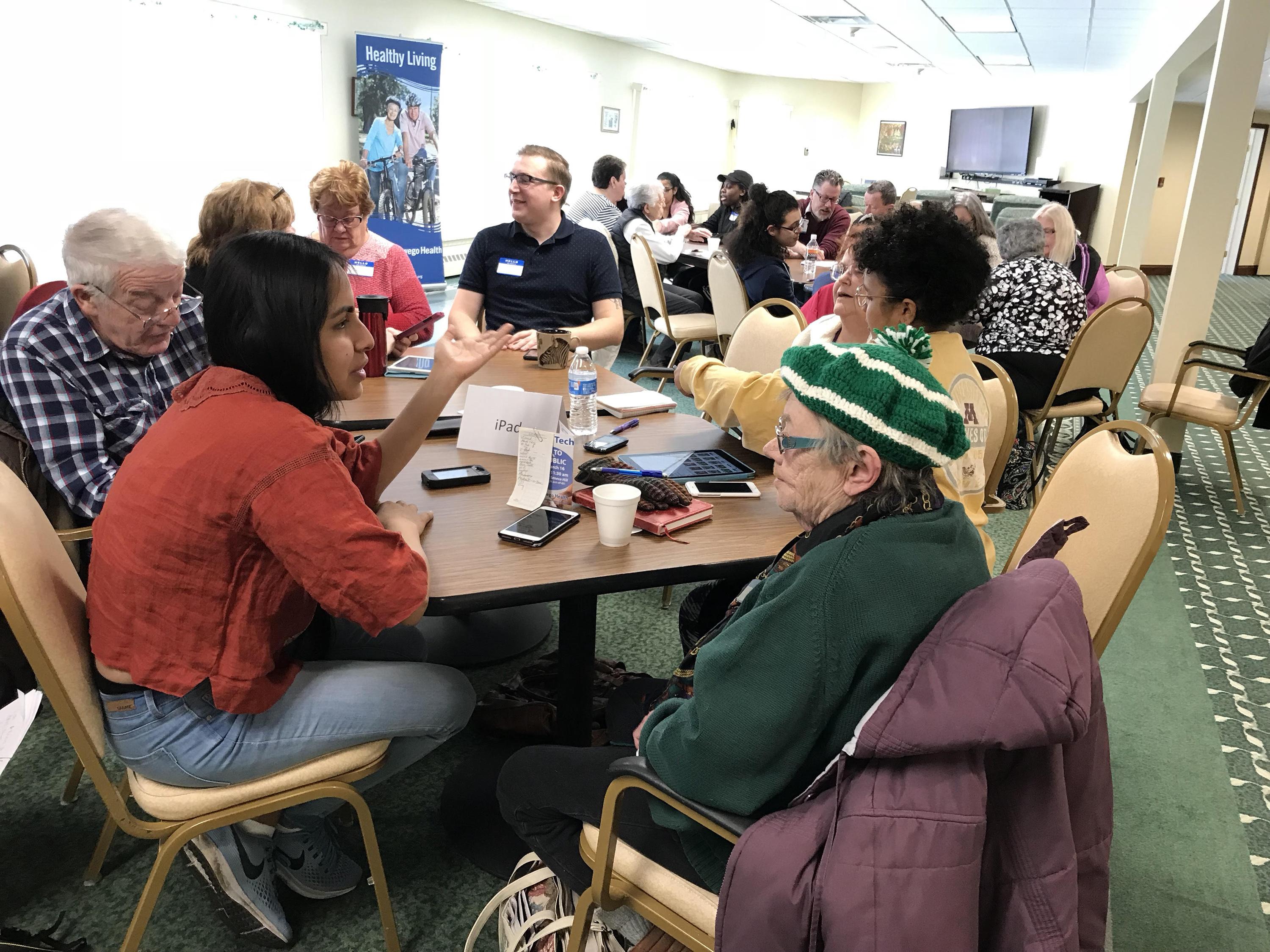Prestigious classification – SUNY Oswego was recently named one of just 119 U.S. colleges and universities to receive the Carnegie Community Engagement Classification, an elective designation that indicates institutional commitment to community engagement. Carnegie recognized the college for its many service activities, such as its alternative break programs. Pictured are students who participated in a local community outreach effort to spend time with senior citizens at Springside at Seneca Hill and help them become more technologically savvy.
The Carnegie Foundation has announced that SUNY Oswego is one of 119 U.S. colleges and universities to receive the Carnegie Community Engagement Classification, an elective designation that indicates institutional commitment to community engagement.
One of only four SUNY institutions with this designation, Oswego first earned the classification in 2010, making this the second consecutive time the Carnegie Foundation has renewed the continuing honor.
This important classification is awarded following a process of self-study by each institution, which is then assessed by a national review committee led by the Swearer Center for Public Engagement at Brown University, the administrative and research home for the Carnegie Community Engagement Classification.
“These newly-classified and re-classified institutions are doing exceptional work to forward their public purpose in and through community engagement that enriches teaching and research while also benefiting the broader community,” noted Mathew Johnson, executive director of the Swearer Center.
“SUNY Oswego’s Strategic Plan encourages the members of our campus community to make an impact through community service and partnerships,” said President Deborah F. Stanley. “The nationally recognized Carnegie designation highlights the college’s commitment to community engagement and recognizes our students, faculty and staff who continue to share talent, service, labor, expertise and problem-solving in mutually-beneficial ways that directly benefit the greater community.”
Rooted in service
SUNY Oswego’s record of service dates back more than 150 years to the founding of the institution by Edward Austin Sheldon. The opening of the Oswego Primary Teachers’ Training School in 1861 was driven by Sheldon’s passion to find a better way to train teachers, help students of all ages learn, and address the educational and social challenges of those days.
Just as Sheldon founded the college to help solve issues in the community and the world at large, SUNY Oswego continues to work with partners in and around Oswego, as well as across the globe, to contribute to the common good and address challenges on many levels.
Oswego’s submission noted how communities the college works with experience increased prosperity, social equity, sustainability, self-sufficiency and greater educational attainment. SUNY Oswego faculty and staff engage and partner with local, national and international communities and make an impact through research, community service and economic development for collective prosperity, equity, resilience and success. In addition, students and external partners develop mutually beneficial relationships in service-learning, internships, cooperative education and community-service initiatives.
The many distinctive service programs the college highlighted in its application include:
- The Smart Neighbors Project, an interdisciplinary program that works closely with the Greater Oswego-Fulton Chamber of Commerce to promote shopping locally, small business partners and community engagement
- Alternative Breaks, which take students to several states and Puerto Rico to build houses, rebuild infrastructure, serve the hungry, preserve nature and more -- as well as adding a local version addressing needs in Oswego County
- Focus-Forward (formerly Mentor-Scholar), where local middle school and high school students work with SUNY Oswego students to develop academic and social skills that help each student achieve their full potential
- Vote Oswego, a classroom-based civic engagement project where students work in a non-partisan way on increasing registration and voter participation; the program has earned national recognition
- Circle of Security Parenting, founded locally by psychology chair Dr. Matt Dykas, translates decades of university-based attachment research into a user-friendly format for parents to learn how to be available, responsive, and sensitive caregivers, while providing secure bases and safe havens for their children
- Digital Oz, a digital showcase for SUNY Oswego student work, where multidisciplinary groups of students work together to create digital representations of their community activities for a public audience
About the Carnegie Foundation for the Advancement of Teaching
The Carnegie Foundation for the Advancement of Teaching aims to build a field around the use of improvement science and networked improvement communities to solve long standing inequities in educational outcomes. The Foundation, through the work of the Carnegie Commission on Higher Education, developed the first typology of American colleges and universities in 1970 as a research tool to describe and represent the diversity of U.S. higher education. The Carnegie Community Engagement Classification has been the leading framework for institutional assessment and recognition of community engagement in U.S. higher education for the past 14 years with multiple classification cycles in 2006, 2008, 2010, 2015 and 2020.
The Carnegie Classification of Institutions of Higher Education (now housed at Indiana University Bloomington’s Center for Postsecondary Research) continues to be used for a wide range of purposes by academic researchers, institutional personnel, policymakers and others. For more information, visit www.carnegiefoundation.org.
About the Swearer Center for Public Service
In 1986, Brown University President Howard Swearer founded one of the first public service centers in the nation, now named for him — the Swearer Center for Public Service. The Swearer Center is a hub of community, scholarship, and action at Brown University. Through innovative programs and fellowships that reach across Rhode Island and around the globe, the Swearer Center connects people to co-create knowledge and positive social change, advances the field of engaged scholarship, and integrates social innovation with community engagement. In 2017, the Swearer Center became the administrative and research home of the Carnegie Community Engagement Classification. For more information, visit www.swearer.brown.edu.




